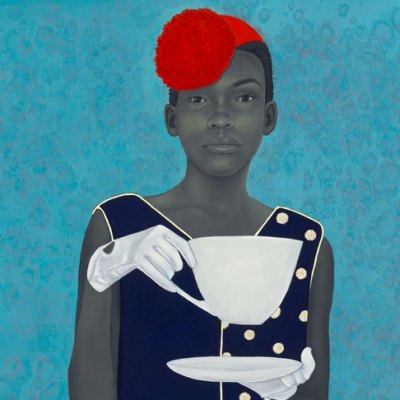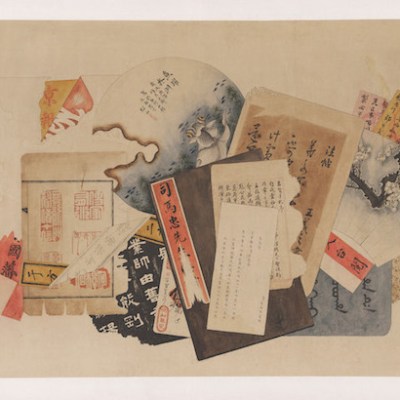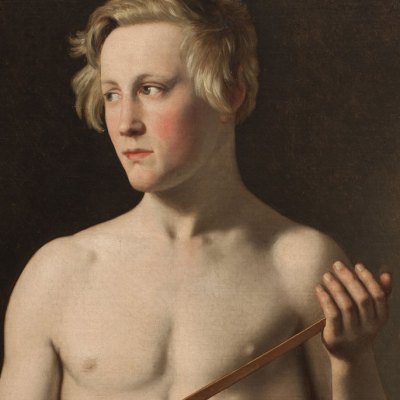I’ve visited enough artist’s studios to know how modest they can be. But I still find it hard to shake off the idea of the studio as a grand, sociable space, in the manner of Courbet’s, dotted with patrons and glamorous friends. Frith Powell’s studio, in a church in North Oxford, is a garret, inconveniently lit and better suited to a writer. Frith Powell is a virtuoso oil painter, a gifted draughtsman and an insatiable transformer of odds and ends – coins, stones, tree roots, consumer detritus – which he hammers, heats or carves into witty miniatures and parades on a table as a platoon of trickster forms. His little congregation makes fun of work, wealth, political economy, and the practice of art itself.
Elegy on Unwritten Paper (2016), Frith Powell. © the artist

Frith Powell is now in his seventies. He began his apprenticeship as a 19-year-old in a building full of artists’ studios on La Giudecca in Venice, run by the Italian painter Carmelo Zotti. He became Zotti’s studio assistant and was taken under the artist’s wing (Zotti also introduced him to De Chirico). Frith Powell went on to study as an undergraduate, then a graduate, at Kontsfack in Stockholm. His work has appeared in group shows in Europe, but mostly he’s played his cards close to his chest, maybe too close: a lifelong reticence about exhibiting and being exhibited has kept his CV as short as a haiku, with two minor solo shows to his name. His first serious solo exhibition has just opened at the Barn Gallery in Oxford. When I visited his monastic working space in September, it was already a beach head for the show, with works stacked and nominated for hanging. One of his children was still building and planing the frames. (His family and friends have spent years nudging him towards this moment.)
Most of Frith Powell’s small, three-dimensional pieces are made under the name Fabio Penitente, to signal a different persona from that of the painter working in two dimensions. The ‘singular apprenticeship’ in the title of the current show speaks to Frith Powell’s unsentimental fascination with artworks and household objects from developing countries, fashioned with immense skill, limited materials and low or intermediate technologies. Inevitably, Fabio Penitente draws our attention to waste and inattentiveness in the rich world.
Two Carved Forms (2004), Frith Powell. © the artist

Still, the pieces to look out for, if you’re in Oxford this month, are the oils on canvas and mixed media on paper. They are the record of a postwar painter’s reaction – impressed and deferential at first, then defiant and resourceful – to the modernist impasse of abstraction (Abstract Expressionism in particular). Frith Powell was stymied by the absolutism of abstraction and the end of history it proposed for critics and curators; above all, for artists. He wasn’t alone.
His way forward – or maybe around – is a plausible repurposing of abstraction: imaginary forms on a ground without depth or narrative, driven by a sense of purpose rather than a festival of process. Patience and finesse are in the ascendant; a relish for assonance across a composition, and for discreet, unpainterly surfaces, purged of gesture. The only story here is a kind of sideways telling, in which forms are brought together on a ground.
Postcard from Utopia (2017), Frith Powell. © the artist

The bits and pieces in Frith Powell’s canvases are culled from his imagination, a kind of metamorphic workshop. Their fantastic quality is offset by the sense they give us that we’ve already seen them, or something like them, in the world beyond the painting. We can study an element in a Frith Powell and argue its resemblance to a plate of fish or an evergreen shrub; a beehive, a one-rung ladder or a shamanic device from an Inuit village.
Yet no likeness holds up for long. The elusive contents of the paintings belong unequivocally to the ‘fiction of reality’ – the artist’s phrase for his own deregulated ‘abstracts’ – that the work brings to life. They are straight from the inventory of shapes and shadows in his mind’s eye. They can only cross the borders of the canvas with a pass issued by the painter, and even then, they’re condemned to head towards another composition: we find them recurring across a lifetime’s work. Each painting is a new ‘MuBild’: a splicing of Japanese and German that translates, I guess, as ‘nothing-picture’. ‘Nothing’ is what Frith Powell was forced to confront in the 1970s, when he drew back from the writings of Clement Greenberg with a stubborn sense that painting might still be possible, even if you couldn’t reinvent the wheel. It turns out he was right.
Frith Powell’s retrospective, ‘The MuBild of Arte Normale and The Singular Apprenticeship of Fabio Penitente’, is at the Barn Gallery, Oxford until 16 November.


